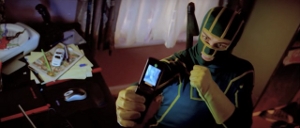 Of all the U.K. comic book writers ‘ported over during the 1980s, Mark Millar stands as an all-time champion of sorts, never missing a chance to destroy the goodwill he’s managed to build up with his audience. Kick-Ass, the book, is a perfect example of this, as well as everything wrong with modern comics in general and Millar’s comics in particular. A cynical, revisionist nightmare disguised as a superhero story, starring yet another morosely-unsympathetic protagonist who sublimates his own misanthropy, misogyny, and angst by dressing up in a silly costume and beating others bloody.
Of all the U.K. comic book writers ‘ported over during the 1980s, Mark Millar stands as an all-time champion of sorts, never missing a chance to destroy the goodwill he’s managed to build up with his audience. Kick-Ass, the book, is a perfect example of this, as well as everything wrong with modern comics in general and Millar’s comics in particular. A cynical, revisionist nightmare disguised as a superhero story, starring yet another morosely-unsympathetic protagonist who sublimates his own misanthropy, misogyny, and angst by dressing up in a silly costume and beating others bloody.
The twist? In the case, Our Hero is himself repeatedly beaten bloody, sent through physical, emotional, and psychological tortures most comic book writers reserve for their female supporting characters (before dutifully stuffing them into refrigerators).
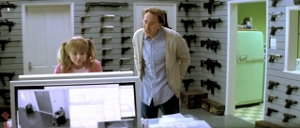 Salacious schadenfreude is all well and good for a while, but the thrill quickly wears off, leaving the same bad taste that clogged my mouth once I finished Millar’s previous book, Wanted. Thankfully, some of us Yanks still believe in sympathetic heroes, altruism, and ideals. We’ll see if that survives our Empire’s protracted collapse. But, until then, we have Kick-Ass, the film, a perfect example of a “comic book movie” done right by filmmakers who understand that, yes, you can poke fun at your target audience without holding us in contempt. Or breaking the fourth wall to rape us in the butt.
Salacious schadenfreude is all well and good for a while, but the thrill quickly wears off, leaving the same bad taste that clogged my mouth once I finished Millar’s previous book, Wanted. Thankfully, some of us Yanks still believe in sympathetic heroes, altruism, and ideals. We’ll see if that survives our Empire’s protracted collapse. But, until then, we have Kick-Ass, the film, a perfect example of a “comic book movie” done right by filmmakers who understand that, yes, you can poke fun at your target audience without holding us in contempt. Or breaking the fourth wall to rape us in the butt.
Like Peter David before me, I mean “perfect” only in the sense of “complete and of its type.” Kick-Ass is not the Second Coming, but nor is it a depressing stroll down Nihilism Avenue. Book and film both tell the story of a down-on-his-luck comic book nerd who takes up costumed vigilantism, both out of simple, teenage, American boredom, and in reaction to the pervasive apathy of the bewildered herd in the face of a corrupt, postmodern society. The difference is one of emphasis and tonal shift management, two things I doubt Millar’s even considered since he slid out from under the withering light of the Big Two’s editorial gaze, and by God it makes for a fun film. Remember “fun”? It’s that thing you used to have with superhero stories?
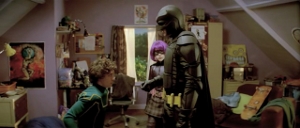 Dave Lizewski (Aaron Johnson) is that aforementioned nerd, a walking cliche no more or less cliched than any of the teenage urbanites he’s meant to represent. Like so many of us, he wonders (aloud, to his equally-nerdy friends), “How come nobody’s ever tried to be a superhero?” The twist? One too many muggings on the way home from the comic book store convince him to order a costume off the internet, suit-up, and confront the pair of gangbangers who’ve been stealing his (and his friend’s) book money lo these many years.
Dave Lizewski (Aaron Johnson) is that aforementioned nerd, a walking cliche no more or less cliched than any of the teenage urbanites he’s meant to represent. Like so many of us, he wonders (aloud, to his equally-nerdy friends), “How come nobody’s ever tried to be a superhero?” The twist? One too many muggings on the way home from the comic book store convince him to order a costume off the internet, suit-up, and confront the pair of gangbangers who’ve been stealing his (and his friend’s) book money lo these many years.
In the movie’s (and the book’s) last nod to realism, Dave’s beaten to a bloody pulp, run over by a car, and hospitalized for an indeterminate amount of time. But since we’re less than half way through the film, Dave emerges from the hospital undeterred, with more metal plates in his body than a Salvation Army soup kitchen and Darkman’s powers of Nerve Damage. No agonizing physical therapy sessions or uncontrolled, homocidal rages for this kid, though.
In a possibly-conscious but probably-unconscious nod to 2001’s The Incredibles, Dave’s attempts to get the inevitable cat out of the inevitable tree end with him saving one anonymous douche from a severe beat-down at the hands of three others. During the fight, Dave unknowingly channels the little voice in every geek’s soul that constantly urges us to put on our various suits and fight crime, after one of the douchebags asks if he’s prepared to die for someone he doesn’t even know?
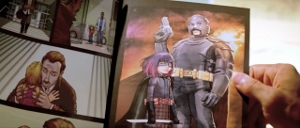 “Three assholes laying into one guy while everybody else watches…and you wanna know what’s wrong with me…? Yeah, I’d rather die.”
“Three assholes laying into one guy while everybody else watches…and you wanna know what’s wrong with me…? Yeah, I’d rather die.”
From a philosophical standpoint, this is a Crowning Moment of Awesome, betraying a sophisticated understanding of what we, the audience, enjoy about these silly costumed hero stories in the first fucking place (unless we’re nihilistic asshats who un-ironically defend Mark Millar’s comics). You can’t spit on mainstream film without hitting some kind of gratuitous violence, and since Hollywood is populated exclusively by bandwagon-jumping whores, costumed vigilantes are now a dime a dozen. But few of Hollywood’s modern heroes are informed by a social conscience as concisely articulate as this. It ain’t John Dewey…but it’s all we’ve got. And by God I’ll take it, because it’s exactly what this story needed…no more, no less.
Video of Dave’s heroics quickly becomes yet another “most popular video on YouTube,” inspiring him to continue his adventures as Kick-Ass. Unfortunately, Kick-Ass’ new celebrity draws both the eye and the ire of local mob boss Frank D’Amico (Mark Strong, last seen around here in Sherlock Holmes), who’s employees have been coming down a bad case of Death lately, the few survivors bandying unbelievable stories about some superhero.
 This is due to the behind-the-scenes machinations of a disgraced former cop named Damon Macready (Nicholas Cage), whom D’Amico framed as a drug dealer some years back. The frame-job sent Damon on a tour of New York’s finer correctional institutions, resulted in the death of his wife, and convinced Damon to dream up “a plan all his own.” Emerging from Riker’s to take charge of his tweenage daughter, Mindy (Chloe Moretz), Damon reconstructed himself as Big Daddy and trained Mindy up for a life of vengeance as his bloodthirsty, pint-sized, occasionally-profane sidekick, Hit-Girl.
This is due to the behind-the-scenes machinations of a disgraced former cop named Damon Macready (Nicholas Cage), whom D’Amico framed as a drug dealer some years back. The frame-job sent Damon on a tour of New York’s finer correctional institutions, resulted in the death of his wife, and convinced Damon to dream up “a plan all his own.” Emerging from Riker’s to take charge of his tweenage daughter, Mindy (Chloe Moretz), Damon reconstructed himself as Big Daddy and trained Mindy up for a life of vengeance as his bloodthirsty, pint-sized, occasionally-profane sidekick, Hit-Girl.
And if you don’t like it, Roger Ebert, you can pass this blunt to the nigga on yer left. That’d be me, and as such I have to say, man, you’re scaring me. The fact that you gave this film a lower rating than Twilight causes me genuine concerned for your sanity. It also speaks volumes about mainstream criticism’s complete inability to enjoy any fantasy violence free of the watered down blandness of “mainstream” morality and approved by six committees-worth of self-appointed finger-wavers. Plenty have used Hit-Girl as a blanket excuse to give their brains the day off when it comes to this film. Their hearts, already hardened by years of scrambling to write something nice enough to appear on posters or DVD boxes, are obviously not large enough to encompass the possibility that, yes, we comic book “fanboys” (and girls, goddmanit) might also have moral problems about the idea of an eleven-year-old mowing down drug dealers with all the ethical qualms of a DEA squad.
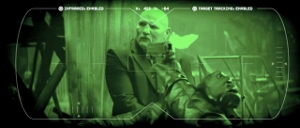 But are movies supposed to emotionally move us or not? So what if Kick-Ass moved you towards a dark and awful place? That (as I’m sure Mark Millar would agree) is the whole flippin’ point. The movie succeeded where plenty others fail, and is that not a good? I’d say I’m sorry it offended your delicate sensibilities, but that would be insincere. That too, is part of the point. But you and your ilk are unwilling to even give the film that, fearing…what, exactly? You might catch some Moral Minority flack the next time a Group of Assholes With Guns runs up on a middle school?
But are movies supposed to emotionally move us or not? So what if Kick-Ass moved you towards a dark and awful place? That (as I’m sure Mark Millar would agree) is the whole flippin’ point. The movie succeeded where plenty others fail, and is that not a good? I’d say I’m sorry it offended your delicate sensibilities, but that would be insincere. That too, is part of the point. But you and your ilk are unwilling to even give the film that, fearing…what, exactly? You might catch some Moral Minority flack the next time a Group of Assholes With Guns runs up on a middle school?
If that’s the case, you obviously haven’t been paying attention these last thirty years. America’s Right Wing Maoists don’t give a rat’s pittut about your critical purity. You’re part of the great Hollywood Machine that’s apparently Teaching Our Kids To Kill, and as such you are their enemy, full stop. They’ve already tarred and feathered this film for the escapist fantasy that it is, hating it with the purity of the uninitiated…a fact that only enhances my love of Kick-Ass, despite the moral qualms that I have with this flick.
For one thing, I’m from a generation who imbibed the Gospel of Bruce Wayne (otherwise known as Batman: The Animated Series) with our mother’s milk. Any “hero” who summarily executes his or her foes earns both my ire and my sarcastic quotation marks. But this film isn’t called Hit-Girl, by God, it’s Kick-Ass. And Dave Lizewski finally wins my heart by reacting to Hit-Girl and Big Daddy’s psychopathy with the same shock and awe as I, were I in his tights.
Unfortunately, this is still a movie, more interested in riffing other recent superhero pictures than discussing the implications of costumed vigilantism as such. Rather than embarking upon a doomed (but ultimately heroic) quest to bring Big Daddy to justice for his mass-murdering, child-abusing assholery, Dave attempts to get The Girl (Lyndsy Fonseca) and, in the film’s final departure from reality, succeeds.
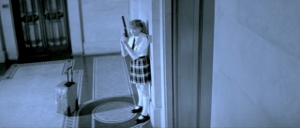 Little nods to movie convention like this mar my otherwise complete enjoyment of Kick-Ass. Of course Big Daddy and Hit-Girl will eschew the Batman’s guiding principal’s of “killing’s bad, m’kay?” Of course Dave’s “nerve damage” will grant him the same neigh-invulnerability Dr. Payton Westlake still enjoys to this day (in my imagination). Of course the Protagonist will Get the Girl in the end, despite the fact that he spent half the movie living that old Bloodhound Gang song, “I just wish I was queer/so I could get chicks.” Despite the fact that any chick with a functional sense of self would mace him, send him screaming from her house, and leave it at that. (Not, as Millar would have us believe, send him pornographic phone pictures out of some misguided attempt at revenge…unless that entire sub-plot really is drawn from Millar’s life…in which case, I stand corrected, and he’s a bigger looser, and a bigger jerk, than even I’d imagined). Despite the fact that she is yet another Mary-Jane-alike, a teenage girl so “perfect” it’s a wonder Dave didn’t have to survive a beating from her muscle-y, jock boyfriend.
Little nods to movie convention like this mar my otherwise complete enjoyment of Kick-Ass. Of course Big Daddy and Hit-Girl will eschew the Batman’s guiding principal’s of “killing’s bad, m’kay?” Of course Dave’s “nerve damage” will grant him the same neigh-invulnerability Dr. Payton Westlake still enjoys to this day (in my imagination). Of course the Protagonist will Get the Girl in the end, despite the fact that he spent half the movie living that old Bloodhound Gang song, “I just wish I was queer/so I could get chicks.” Despite the fact that any chick with a functional sense of self would mace him, send him screaming from her house, and leave it at that. (Not, as Millar would have us believe, send him pornographic phone pictures out of some misguided attempt at revenge…unless that entire sub-plot really is drawn from Millar’s life…in which case, I stand corrected, and he’s a bigger looser, and a bigger jerk, than even I’d imagined). Despite the fact that she is yet another Mary-Jane-alike, a teenage girl so “perfect” it’s a wonder Dave didn’t have to survive a beating from her muscle-y, jock boyfriend.
(Oh, right…in the comic, he did. And I’ll give Millar this: at least he’s grown up enough to realize not every protagonist needs a romantic attachment to justify their existence. Now if only he could let go of that rampaging Madonna/Whore Complex…I’m sure Frank Miller’s going to want that shtick back eventually).
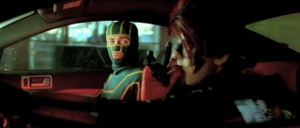 But I don’t mind all that because it’s all tangential to the real story, a story of Dave (and his world) grappling with the presence of “real life” superheros and the emotional/psychic toll of superheroing in general. In this, Aaron Johnson excels. His sense of wonderment and awe is palpable, believable, and sustained. He carries the film on his sleeve and could obviously teach a certain person named Toby a thing or three about bringing nerds to believable, on-screen life. Nick Cage finally redeems himself in my eyes, bringing more nuance and depth to his role as an ersatz Frank Castle than any previous Punisher to date…all while doing a spot-on Adam West impersonation. It’s he who sells the ethically fucked-up relationship between Damon and Mindy, playing an obviously-haunted man who’s nevertheless managed to rediscover Love and Wonder in Life by sublimating all the urges “normal” child-abusers express with their fists into a protracted campaign for revenge. And all those who take knee-jerk offense at Hit-Girl’s character, consider this: if Chloe Moretz weren’t such a good actress, and didn’t do such a good job of convincing us that she really is her father’s homicidal daughter, would you still complain so vociferously about this film’s lack of a moral compass?
But I don’t mind all that because it’s all tangential to the real story, a story of Dave (and his world) grappling with the presence of “real life” superheros and the emotional/psychic toll of superheroing in general. In this, Aaron Johnson excels. His sense of wonderment and awe is palpable, believable, and sustained. He carries the film on his sleeve and could obviously teach a certain person named Toby a thing or three about bringing nerds to believable, on-screen life. Nick Cage finally redeems himself in my eyes, bringing more nuance and depth to his role as an ersatz Frank Castle than any previous Punisher to date…all while doing a spot-on Adam West impersonation. It’s he who sells the ethically fucked-up relationship between Damon and Mindy, playing an obviously-haunted man who’s nevertheless managed to rediscover Love and Wonder in Life by sublimating all the urges “normal” child-abusers express with their fists into a protracted campaign for revenge. And all those who take knee-jerk offense at Hit-Girl’s character, consider this: if Chloe Moretz weren’t such a good actress, and didn’t do such a good job of convincing us that she really is her father’s homicidal daughter, would you still complain so vociferously about this film’s lack of a moral compass?
(Of course you would, but never mind.)
And speaking of morals, there’s a degree of shading and depth to Mark Strong’s cotillion of post-Soprano’s mobsters that I might as well lay at his feet, making up for all the bad things I never got a chance to say about him in my Sherlock Holmes review because, there, his villain was just so damn boring. Here, Frank D’Amico’s conflicted relationship to his son Chris (Christopher Mintz-Plasse) allows Strong to actually show some chops, as well as forming a thematic reflection of the Macreadys. I really can believe D’Amico’s the kind of guy who would beg off torturing a disgraced minion because he and his son are already late for the movies. Little bits of characterization work (like that, or Chris’ very presence – much expanded from what it was in the comic) allow Frank to be more than a stock Carlione rip-off and make for a more dynamic interplay between the “good” and “evil” sides of the plot. Both of which pivot on Christopher Mintz-Plasse, who begins and ends the film wanting to please his own Big Daddy, turning down his one chance at redemption in favor of the Mobster’s Life…with disastrous consequences for every one else, including himself.
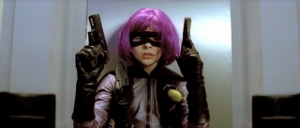 But a uniformly good cast is nothing with a good script (see also, Heaven’s Gate). Thankfully, Jane Goldman and director Matthew Vaughn have polished the hell out of Millar’s turd, turning it into a well-paced, tightly constructed romp through what could’ve easily been little more than an extended excuse for carnage. Vaughn helps by throwing in directorial flourishes that aid the story, both by fitting in thematically and by not getting in the damn way. Stand outs include the Macready family origin, told in voiceover by Cage and placed atop sweeping, three-dimensional renders of some rather good John Romita Jr. artwork (thankfully unobstructed by the three liters of blood per panel Millar insisted appear in the comic). Or Big Daddy’s key fight scene, where, thanks to judicious editing, what begins as your usual, boring, Steadicam tracking shot ends up looking as close to a “living comic book” as anything I’ve ever seen. It’s as if Vaughn temporarily turned the director’s chair over to Denys Cowan…and if you recognized that name without the aid of the “internets” this is officially your film.
But a uniformly good cast is nothing with a good script (see also, Heaven’s Gate). Thankfully, Jane Goldman and director Matthew Vaughn have polished the hell out of Millar’s turd, turning it into a well-paced, tightly constructed romp through what could’ve easily been little more than an extended excuse for carnage. Vaughn helps by throwing in directorial flourishes that aid the story, both by fitting in thematically and by not getting in the damn way. Stand outs include the Macready family origin, told in voiceover by Cage and placed atop sweeping, three-dimensional renders of some rather good John Romita Jr. artwork (thankfully unobstructed by the three liters of blood per panel Millar insisted appear in the comic). Or Big Daddy’s key fight scene, where, thanks to judicious editing, what begins as your usual, boring, Steadicam tracking shot ends up looking as close to a “living comic book” as anything I’ve ever seen. It’s as if Vaughn temporarily turned the director’s chair over to Denys Cowan…and if you recognized that name without the aid of the “internets” this is officially your film.
Frankly, it’s our film: by and for nerds intelligent enough to realize how silly our nerdy fantasies are…and secure enough in them, and in ourselves, to revel in them anyway. So rejoice, be exceeding glad, and go forth to make Kick-Ass the Fight Club home video success of its generation. Never forget this shinning, live-long moment, or the fact that we are everywhere…even in the dank bowls of Hollywood. Despite the fact it’ll never win a Gandhi Award, Kick-Ass does what every good film should, congealing into more than the sum of its parts, something both mindful and fun.
You remember “fun” right?
![]()
![]()
![]()
![]()
